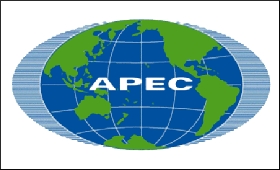|
|
|

|
India should be an APEC member: Australian Shadow Trade Minister
|
|

|
|
| Top Stories |
 |
|
|
|
Biswajit Choudhury | 24 Jan, 2019
With trade becoming fundamental for global peace and stability and
preventing the US-China kind of trade wars, it is vital to push for an
Indo-Pacific free trade zone like the Asia-Pacific Economic Cooperation
(APEC) that should include India, a leading Australian politician has
said.
APEC is a free trade agreement among 21 Pacific Rim member
economies to which India has been seeking admission. It includes
Australia, Brunei, Canada, Chile, China, Hong Kong, Indonesia, Japan,
South Korea, Malaysia, Mexico, New Zealand, Papua New Guinea, Peru, the
Philippines, Russia, Singapore, Thailand, the US and Vietnam.
Australia
has been pushing India's case for induction into the APEC, as well as
in the United Nations Security Council (UNSC). Promoting Indian
membership of these bodies has bipartisan support in Australia
irrespective of the party in power, Shadow Minister for Trade and Labour
MP Jason Clare told IANS in an interview here.
Clarke, who was
on a brief visit to New Delhi, also took part in a CII sponsored meeting
with representatives of Indian industry like Wipro, Aditya Birla Group,
and Vikram Solar, as well as institutions like Amity University which
have either an established presence in Australia or are looking to do
business there.
"The world is different today from what it was
years ago when the United Nations was founded. India is poised to become
the world's third largest economy and requires to be represented at the
UNSC...it has Australia's support," Clare said.
He referred to
the report released last year by the Australian government titled "India
Economic Strategy to 2035: Navigating from potential to delivery"
authored by its former High Commissioner in New Delhi Peter Varghese
which argues that India should be brought into the APEC.
"For
Australia, India is a partner in seeking to forge regional institutions
in the Indo-Pacific and so needs to be part of the APEC. India needs to
represent the Indo-Pacific in APEC, which doesn't make sense without
India," Clare said.
In this connection, the Australian
politician pointed to the revival of the quadrilateral - "Quad" -
initiative that was revived a year ago involving India, Australia Japan
and the US as a "welcome initiative on strategic issues."
The Quad of democratic countries advocate a free and open Indo-Pacific for shared peace and prosperity.
"If
countries like India, China, Australia need to achieve their growth
goals we need peace and stability in the region. Over the long term we
need to aim for an APEC free trade agreement that involves the major
powers like US, China, India, Australia, Indonesia," Clare said.
Referring
to the ongoing US-China trade war, he said that a "lot of people in the
US and UK are worried about trade endangering jobs", but for Australia
it is important to grow its trade with countries of the region.
"Both
Australia and India see China as an important part of inclusive
regional institutions," the Australian Shadow Trade Minister said.
On
India's chances of APEC membership, he pointed to the hopeful fact of
APEC members also being involved in the negotiations for the Regional
Comprehensive Economic Partnership (RCEP) that includes India. RCEP is a
proposed free trade agreement (FTA) between the ten member states of
the Association of Southeast Asian Nations (ASEAN) and the six
Asia-Pacific states with which ASEAN has existing free trade agreements
(Australia, China, India, Japan, South Korea and New Zealand).
"APEC
members are involved in the RCEP discussions, so it is a logical next
step for India to becoming part of APEC," Clare said, adding that he is
hopeful about the RCEP negotiations concluding this year.
According
to the "India Economic Strategy" report, no single market over the next
20 years will offer more growth opportunities for Australia than India.
The
report targets Australian exports to India to grow from $15 billion in
2017 to around $45 billion by 2035 and outward Australian investments to
India rise from $10.3 billion to over the $100 billion mark, reflecting
a transformational expansion of the relationship.
"Australians
have been hesitant about doing business outside the country and they
have to be bold about seizing opportunities overseas," Clare said.
On
the pending negotiations for an India-Australia Comprehensive Economic
Partnership Agreement (CEPA), or free trade pact, he said that Australia
is pinning its hopes on an early finalisation of RCEP.
"Since
RCEP is a wider free trade agreement proposal, our bilateral CEPA talks
will be taken up afterwards. We're hoping to finalise RCEP by end of
this year," he said.
|
|
|
| |
|
|
|
|
|
|
|
|
|
|
|
|
|
|
| |
| Customs Exchange Rates |
| Currency |
Import |
Export |
US Dollar
|
84.35
|
82.60 |
UK Pound
|
106.35
|
102.90 |
Euro
|
92.50
|
89.35 |
| Japanese
Yen |
55.05 |
53.40 |
| As on 12 Oct, 2024 |
|
|
| Daily Poll |
 |
 |
| Do you think Indian businesses will be negatively affected by Trump's America First Policy? |
|
|
|
|
|
| Commented Stories |
 |
|
|
|
|
|
| |
|